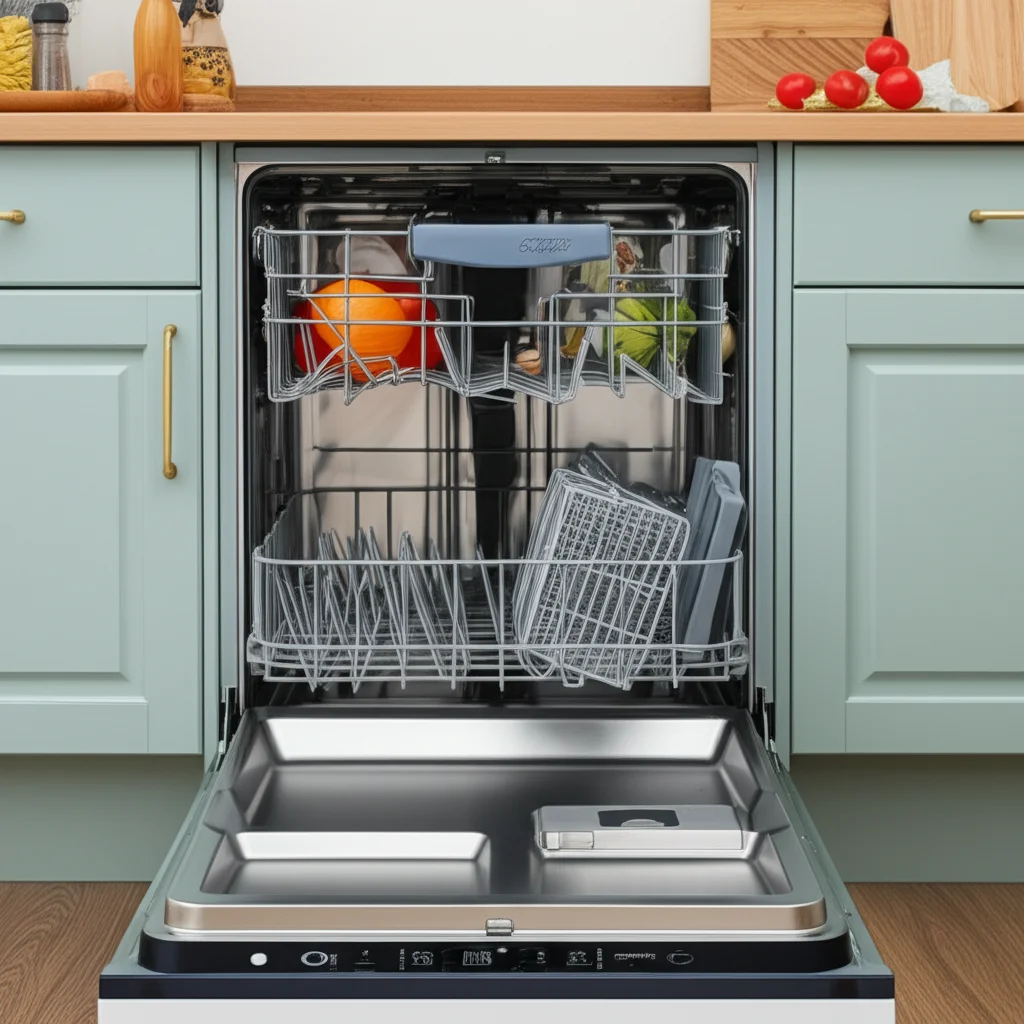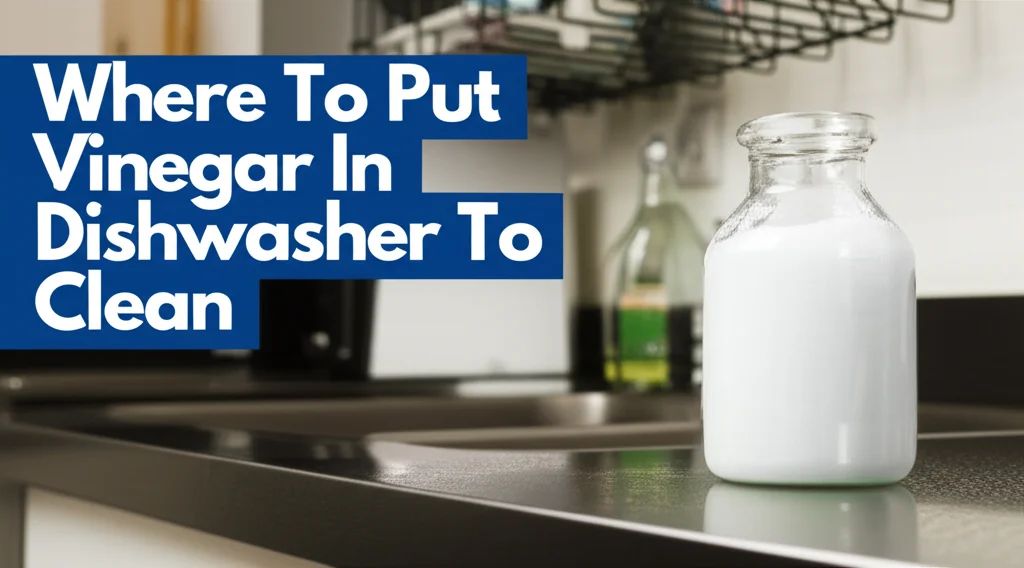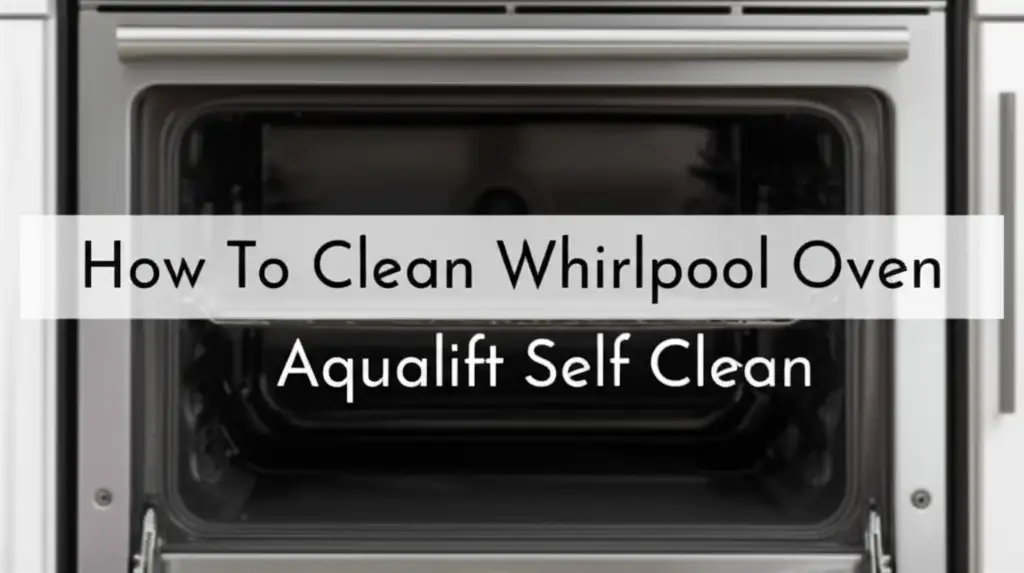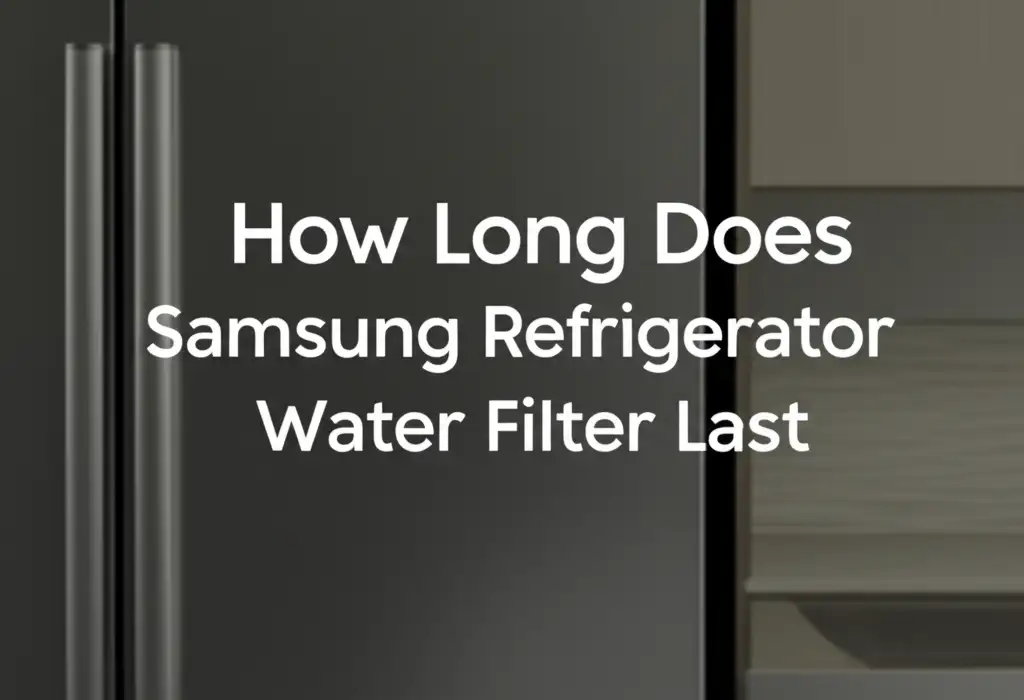· Todd Martin · Appliance Maintenance · 19 min read
Why Does My Ge Dishwasher Smell

Why Does My GE Dishwasher Smell? Unmasking the Odor Source
Have you ever opened your dishwasher, expecting fresh, clean dishes, only to be met with an unwelcome, lingering smell? A strange odor coming from your GE dishwasher can be quite frustrating. It makes you wonder if your dishes are truly clean. You might ask, “Why does my GE dishwasher smell?” This common issue often points to easily fixable problems.
This guide will explain why your GE dishwasher smells bad. We will explore the common reasons behind these odors. We will then provide clear steps to eliminate them. You will learn how to clean specific parts of your appliance. We will also discuss routine maintenance tips. Our goal is to help you restore a fresh scent and peak performance to your dishwasher.
Takeaway
- Clean the Filter Regularly: Food particles trapped in the filter are a primary cause of odors. Rinse it after every few cycles.
- Inspect and Clean the Drain Area: Stagnant water or debris in the drain can lead to foul smells. Clear any blockages immediately.
- Combat Mold and Mildew: Regularly wipe down gaskets and seals, and run hot cycles with cleaner to prevent growth.
- Use Proper Detergent and Cycle: Avoid too much detergent and use a hot water wash to effectively clean and sanitize the machine.
- Ensure Proper Drainage: Check the drain hose and air gap for kinks or blockages to allow water to exit completely.
Why does my GE dishwasher smell? Your GE dishwasher typically smells due to trapped food particles, grease buildup, mold, or mildew growth in internal components like the filter, drain, spray arms, and door seals. Inadequate drainage or excessive detergent use can also contribute to unpleasant odors.
The Common Culprits Behind Your GE Dishwasher’s Odor
It can be baffling when your GE dishwasher starts to smell unpleasant. This issue is quite common, and usually, the cause is straightforward. Most odors come from organic matter. These are often food particles that break down inside the machine. Understanding these common culprits helps you address the problem directly.
One primary reason for a bad smell is leftover food. Small bits of food can accumulate. They stick to the filter, drain, or spray arms. Over time, these particles decay. This creates a foul odor. The damp, warm environment inside a dishwasher encourages this breakdown.
Another major cause is mold or mildew. These fungi thrive in moist, dark places. Your dishwasher’s interior, especially door seals and corners, provides an ideal home. Mold gives off a musty, stale smell. It indicates a need for deeper cleaning.
Sometimes, the problem lies with water itself. Hard water leaves mineral deposits. These deposits can trap grime. Improper drainage also means stagnant water. Stagnant water becomes a breeding ground for bacteria. All these factors contribute to the unpleasant smell.
Addressing these issues typically involves routine cleaning and proper maintenance. You can prevent most bad smells with simple steps. Regular attention keeps your dishwasher running well. It also keeps your kitchen smelling fresh.
Addressing Food Particle Buildup and Filter Blockages
Food particles are the most frequent cause of bad smells in a GE dishwasher. Even if you scrape plates, small food bits get washed off. These particles then get trapped inside the dishwasher. They often end up in the filter or around the drain.
Over time, these trapped food scraps decay. This creates a really unpleasant odor. The warm, moist conditions inside the dishwasher speed up this decomposition. It is important to remove these particles regularly. This stops the smell from developing.
Many modern GE dishwashers have a self-cleaning filter. However, even these need occasional checking. Older models or some newer ones have a manual filter. This filter requires physical removal and cleaning. Ignoring the filter allows debris to accumulate.
A clogged drain also contributes to the problem. Food can settle in the drain area. This prevents water from fully draining away. Stagnant water and decaying food create a very strong smell. Clearing these blockages is a key step to freshness.
You might also notice gunk on the spray arms. Food particles can stick here. They can even block the spray holes. This reduces cleaning effectiveness and adds to the smell. Keeping these parts clear helps a lot.
Inspecting and Cleaning the Filter
Finding and cleaning your GE dishwasher filter is often the first step to remove odors. Most GE models have the filter located at the bottom of the tub. It is usually a cylindrical or flat screen. You can typically twist or lift it out.
Once you remove the filter, you will likely see trapped food debris. This could include rice, pasta, vegetable bits, or small bones. Rinse the filter under running water. Use a soft brush, like an old toothbrush, to gently scrub away stubborn grime. Pay attention to all crevices.
You can also use a mixture of warm water and dish soap for a thorough clean. Make sure all visible particles are gone. This simple act can dramatically improve your dishwasher’s smell. A clean filter ensures proper drainage and prevents future clogs. Regular filter cleaning is a crucial part of routine maintenance for your GE dishwasher. For a more detailed guide on this process, you can refer to our article on how to clean the filter in a dishwasher.
Clearing the Drain Trap
The drain trap is another area where food particles can collect. This is typically located just below the filter. Sometimes, larger items might fall into the trap. This can block water flow. If water sits at the bottom of your dishwasher after a cycle, the drain trap might be clogged.
To clear the drain trap, ensure the dishwasher is off. Remove the filter as described above. Then, carefully inspect the drain opening. You might need a flashlight to see clearly. Use gloves and remove any visible debris by hand. A small pair of pliers or tweezers can help with stubborn items.
Sometimes, sludge can build up in the drain hose itself. This sludge is a mixture of grease and food particles. It creates a very unpleasant, often greasy, odor. Running hot water or a dishwasher cleaner through the empty machine can help flush this out. If your dishwasher has persistent draining issues, it may indicate a deeper clog. You can learn more about how to clean your dishwasher’s drain by visiting our guide on how to clean a dishwasher drain. This will ensure proper water removal and prevent standing water smells. For serious sludge issues, consider our article on how to clean sludge from dishwasher.
Combating Mold and Mildew in Your GE Appliance
Mold and mildew love damp, dark environments, and your GE dishwasher can be an ideal breeding ground. These fungi thrive on residual moisture and food particles. They produce a musty, earthy, or even rotten smell. This smell often gets worse after a cycle.
The rubber gaskets around the door are a common spot for mold. Water and detergent residue can collect there. This creates a perfect spot for growth. Mold can also grow inside the spray arms or along the inner walls. It can even be in hidden areas like the pump housing.
If you see black, pink, or orange discoloration, it is likely mold or mildew. Even without visible signs, a persistent musty smell points to its presence. Cleaning these areas thoroughly is crucial. This not only removes the odor but also prevents health issues. Regular maintenance can stop mold from taking hold.
Gasket and Door Seal Inspection
The door gasket is a prime location for mold and mildew. This rubber seal keeps water inside your GE dishwasher during a cycle. Over time, food debris, grease, and moisture get trapped within its folds. This creates an ideal environment for mold to grow. Inspecting this area should be a regular part of your cleaning routine.
To clean the gasket, open the dishwasher door completely. Look closely at the entire rubber seal. Use a damp cloth soaked in white vinegar or a mixture of baking soda and water. Carefully wipe away any visible grime, mold, or discoloration. You may need to pull back the folds of the gasket to reach hidden areas. A toothbrush can help scrub stubborn spots.
After cleaning, dry the gasket thoroughly. Leaving it damp can encourage new mold growth. This simple step goes a long way in preventing musty odors. A clean gasket also ensures a proper seal. This means no leaks during operation. For more in-depth advice on removing mold, see our guide on how to clean mold in dishwasher. If you’re dealing with visible mold on surfaces, our article on how to clean mold off dishwasher offers additional strategies.
Spray Arm and Interior Surfaces
The spray arms in your GE dishwasher are essential for cleaning dishes. They have small holes that spray water during the wash cycle. However, these holes can become clogged with food particles or mineral deposits. This reduces the spray arm’s effectiveness. It also creates areas where mold can start to grow.
To clean the spray arms, remove them if possible. Most GE models allow you to unscrew or unclip them easily. Use a toothpick or a small wire to clear any blocked spray holes. Rinse the arms thoroughly under running water. Wipe down the entire surface of the spray arms.
While the spray arms are off, take time to wipe down the interior walls and bottom of the dishwasher tub. Use a solution of vinegar and water or a dishwasher cleaner. Pay attention to corners and crevices where grime can accumulate. A clean interior ensures dishes get properly cleaned. It also helps prevent any lingering smells. A clean interior means a fresh-smelling appliance.
Optimizing Drainage: Hoses, Air Gaps, and Beyond
Proper drainage is critical for a smell-free GE dishwasher. If water cannot fully drain, it becomes stagnant. Stagnant water is a breeding ground for bacteria and mold. This results in a very unpleasant, often sewage-like, odor. The issue can stem from several points in the drainage system.
The drain hose carries water out of the dishwasher. If it becomes kinked or clogged, water backs up. Over time, grease and food particles can build up inside the hose. This creates a slimy blockage. This blockage not only smells bad but also stops proper draining.
Many dishwashers also have an air gap. This is a small fixture on your countertop near the faucet. It prevents dirty water from flowing back into your clean water supply. If the air gap gets clogged, it can also cause drainage problems. Water might back up into the dishwasher or even spill onto the countertop.
Sometimes, the issue is with your home’s plumbing. The garbage disposal, if connected, can affect dishwasher drainage. Food waste in the disposal can block the shared drain line. Ensuring your disposal is clear and running before a dishwasher cycle is a good practice. Addressing drainage issues is vital for stopping persistent odors.
Checking the Drain Hose
The drain hose is a common culprit for foul odors if not properly maintained. It connects your GE dishwasher to your home’s drain system, often leading to the sink drain or garbage disposal. Over time, grease, soap scum, and food particles can accumulate inside this hose. This creates a slimy residue. This residue not only restricts water flow but also starts to rot.
First, check the hose for visible kinks or bends. A kink can prevent water from draining completely. Straighten any kinks you find. Next, consider detaching the hose if you are comfortable. Be sure to turn off the power to the dishwasher first. You can often flush it out with hot water or a strong vinegar solution. This helps break down internal blockages.
If the hose is severely clogged, you might need to replace it. This is especially true if flushing does not work. A clear drain hose ensures all dirty water leaves the dishwasher. This prevents stagnant water from causing bad smells. You can find more specific troubleshooting for draining issues in our article, When Dishwasher Does Not Drain. This resource provides a deeper look into fixing drainage problems.
Ensuring Proper Air Gap Function
Many GE dishwashers use an air gap device. This is a safety feature usually found on your kitchen countertop next to the faucet. It looks like a small, cylindrical cap. The air gap prevents dirty dishwasher water from siphoning back into your clean water supply. It also helps with drainage.
If the air gap gets clogged, it can impede proper draining. This can cause water to back up into the dishwasher. You might also notice water leaking from the air gap cover. To check it, remove the cover and the cap. Inspect the inner chamber for any blockages. These are often food particles or mineral deposits.
You can clean the air gap by clearing any visible debris. Use a small brush or a paper clip to dislodge stubborn clogs. Flush it with water to ensure it flows freely. Reassemble the components securely. A properly functioning air gap ensures smooth drainage. This prevents standing water and the odors associated with it.
Tackling Hard Water and Detergent Residue
Hard water is a common issue in many homes. It contains high levels of minerals, like calcium and magnesium. When this water dries inside your GE dishwasher, it leaves behind mineral deposits. These deposits are often whitish or chalky. They can build up on the interior surfaces, heating element, and even your dishes.
These mineral deposits can trap food particles and detergent residue. This creates a rough surface where bacteria can easily cling. Over time, this buildup contributes to an unpleasant, often musty or metallic, smell. It also reduces your dishwasher’s cleaning efficiency. Your dishes might come out with a cloudy film.
Using too much detergent also causes problems. Excess soap does not rinse away completely. It leaves a sticky film inside the dishwasher. This film traps dirt and encourages mold growth. It can also create an odor. Finding the right amount of detergent is important.
Both hard water deposits and detergent residue require specific cleaning methods. Regular attention to these issues prevents odors. It also keeps your dishwasher performing its best. This ensures dishes come out spotless and your appliance smells fresh.
The Impact of Hard Water
Hard water can have a significant impact on your GE dishwasher’s cleanliness and smell. The minerals in hard water, mainly calcium and magnesium, form scale deposits. These deposits stick to the inside of your dishwasher. They coat the heating element, spray arms, and the tub walls. This scale creates a rough surface.
This rough surface acts like a magnet for food particles and soap scum. These particles get trapped in the scale. They then decompose, causing bad smells. Hard water also makes detergent less effective. The detergent has to work harder to break down mineral buildup before it can clean dishes. This leaves a residue on dishes and inside the machine.
Regularly descaling your dishwasher is important. You can use white vinegar or citric acid for this. Running an empty cycle with these cleaners helps dissolve mineral buildup. This removes the surface where odor-causing particles can cling. It also improves your dishwasher’s overall performance. A descaled dishwasher runs more efficiently and smells cleaner.
Using the Right Detergent Amount
Using too much detergent might seem like a good idea for cleaner dishes, but it can actually lead to odors in your GE dishwasher. When you use an excessive amount, the dishwasher struggles to rinse it all away. This leaves a sticky residue inside the tub. This residue, also known as soap scum, traps food particles.
This trapped food and soap scum then become a breeding ground for bacteria and mold. This creates a musty or even chemical smell. The residue can also clog spray arm holes. This reduces cleaning effectiveness. It also leaves your dishes less clean and potentially streaky.
Always follow the manufacturer’s recommendations for detergent dosage. This information is usually on the detergent packaging. Adjust the amount based on your water hardness and how dirty your dishes are. If you have soft water, you may need less detergent. If you have hard water, using a rinse aid can help. Rinse aid prevents mineral deposits and helps dry dishes better. For an effective natural cleaning method that can also help with residue, consider running a cycle with vinegar. Our article on how to clean dishwasher with vinegar provides detailed instructions. You can also find tips on where to put vinegar in dishwasher to clean to ensure proper application.
Routine Maintenance for a Fresh GE Dishwasher
Regular maintenance is the best way to prevent your GE dishwasher from smelling. Simple, consistent habits can make a big difference. Think of it like brushing your teeth; a little effort daily prevents bigger problems later. These practices keep your machine clean and efficient.
One important habit is pre-rinsing or scraping dishes. While modern dishwashers can handle some food, removing large scraps helps. This reduces the amount of debris entering the filter and drain. Less debris means fewer things to rot and smell bad. It also helps your dishwasher run more smoothly.
Running cleaning cycles regularly is also key. Even if your dishwasher seems clean, invisible buildup occurs. Using a dedicated dishwasher cleaner, vinegar, or baking soda helps. These agents break down grease, food residue, and mineral deposits. They also sanitize the interior.
Finally, allow the dishwasher to air out between cycles. Trapped moisture encourages mold and mildew. Opening the door slightly after a cycle lets air circulate. This helps dry the interior. It reduces the damp environment that odors love. Proactive steps lead to a fresh, clean appliance.
Regular Deep Cleaning Practices
Deep cleaning your GE dishwasher should be a regular part of your home maintenance. This goes beyond just wiping surfaces. It involves running dedicated cleaning cycles. These cycles use powerful agents to break down stubborn grime and odors. Aim to do a deep clean at least once a month, or more often if you use your dishwasher frequently.
One popular method uses white vinegar. Place a cup of white vinegar in an open, top-rack-safe bowl. Run a hot water cycle with the dishwasher empty. The vinegar helps to dissolve grease, soap scum, and mineral deposits. It also neutralizes odors. After the vinegar cycle, sprinkle a cup of baking soda on the bottom of the tub. Run a short, hot cycle again. Baking soda absorbs lingering smells.
There are also commercial dishwasher cleaning products available. These often come in tablets or liquid form. Follow the product instructions carefully. They are designed to target specific buildups. Consistent deep cleaning will keep your GE dishwasher smelling fresh. It also extends its lifespan. For a comprehensive guide on keeping your appliance sparkling, explore our article on how to clean the inside of a dishwasher. You can also find more general tips for a fresh machine in our piece on how to clean a smelly dishwasher. For a complete deep cleaning approach, read our how to deep clean a dishwasher guide.
Best Practices for Loading and Pre-rinsing
How you load your GE dishwasher affects its cleaning effectiveness and potential for odors. Do not overload the dishwasher. Overloading blocks water and detergent from reaching all surfaces. This leaves food residue on dishes. It also means the machine itself does not get a proper rinse.
Make sure dishes do not block the spray arms. Spin the spray arms by hand to check for obstructions. Load items so water can freely circulate around them. Place larger items on the bottom rack. Cups and bowls go on the top rack, facing down.
Pre-rinsing dishes is a debated topic. Modern dishwashers are designed to handle some food debris. However, scraping off large food scraps is always recommended. This includes bones, seeds, and excess sauces. These larger pieces are more likely to clog the filter or drain. They contribute significantly to odors. A quick scrape can prevent future smells. It helps your dishwasher work more efficiently too.
When Professional Help is Needed for Your GE Dishwasher
Most GE dishwasher smells can be solved with thorough cleaning and routine maintenance. However, there are times when a persistent odor indicates a deeper problem. These issues might require professional attention. Recognizing when to call a technician can save you time and prevent further damage.
If you have tried all the cleaning methods mentioned and the smell remains, it could be a mechanical issue. This might involve a problem with the drain pump. It could also be a damaged seal that allows sewer gases to enter. These problems are often beyond a typical DIY fix.
Another sign is if your dishwasher stops draining completely. Or if it frequently leaves standing water. This indicates a serious clog or pump malfunction. These issues can cause strong, unpleasant odors that cleaning alone cannot fix. A professional can diagnose and repair these parts safely.
Sometimes, the smell might be unusual, like an electrical burning smell. This indicates a serious electrical fault. Turn off the dishwasher immediately if you notice such an odor. Do not attempt to fix it yourself. This is a safety hazard. Knowing when to get expert help protects your appliance and your home.
Persistent Odors
If your GE dishwasher still smells bad after multiple thorough cleanings, it may indicate a more complex problem. You might have cleaned the obvious areas, but hidden issues can persist. These persistent odors are often a sign of something deeper within the appliance or your plumbing system.
For example, the issue could be with the internal plumbing. This includes the p-trap under your sink or the main drain line. Sewer gases can sometimes back up into the dishwasher if the p-trap is dry or improperly installed. This creates a very strong, unpleasant odor. This kind of problem often needs a plumber.
Another possibility is a bacterial buildup deep within the pump or drain assembly. These areas are not easily accessible for home cleaning. Over time, a biofilm can form, releasing continuous odors. A service technician has specialized tools and knowledge. They can dismantle parts of the dishwasher to clean these hard-to-reach areas. This helps eliminate the root cause of the smell.
Mechanical Issues
Beyond just odor, certain mechanical issues can cause your GE dishwasher to smell. A failing drain pump is one example. If the pump is weak, it may not remove all the water. This leaves standing water in the tub. Stagnant water quickly becomes foul-smelling. You might notice dishes are still wet or water remains at the bottom of the dishwasher
- GE dishwasher smell
- dishwasher cleaning
- appliance maintenance
- odor removal
- kitchen cleaning
- dishwasher repair
- home solutions





